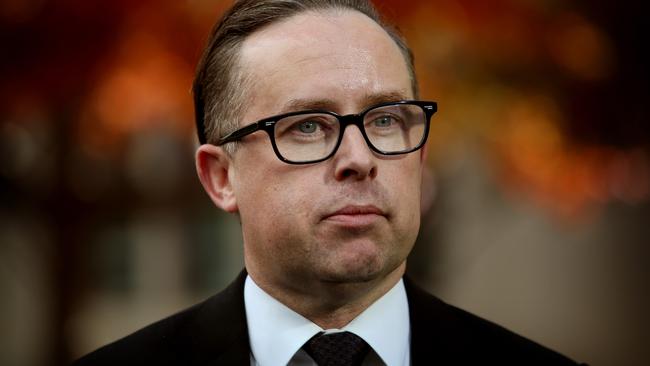Airlines mull ways to combat unruly passenger behaviour
Qantas boss Alan Joyce says it important to send a message that disruptive behaviour on flights is “not acceptable”.

Qantas boss Alan Joyce says it important to send a message that disruptive behaviour on flights is “not acceptable” amid escalating calls to bolster the position of airlines globally in dealing with unruly passengers.
Australia’s national carrier had invested “a lot” in training staff to handle incidents “but we have to try and stop the incidents occurring and that I think is sending a message that this is not acceptable”, Mr Joyce said from the sidelines of this week’s International Air Transport Association annual general meeting in Cancun, Mexico.
Virgin Australia Airlines group executive John Thomas said some incidents were “near impossible to overcome”, but it was important to try “to get ahead of the curve”.
The issue featured in talks among hundreds of senior airline executives at Cancun this week as they look to combat the rise in the number of incidents involving unruly passengers.
IATA assistant director of external affairs, Timothy Colehan, said “this is a problem which seems to be getting worse”.
IATA statistics show the number of reports of incidents of unruly passengers went up from one in every 1282 flights in 2014 to one in every 1205 the next year. While most incidents involved verbal abuse, ignoring crew instructions and other anti-social behaviour, a significant share included physical aggression or damage to the aircraft.
Mr Colehan said better deterrents were needed and IATA wanted nations to act faster in adopting the International Civil Aviation Organisation’s Montreal Protocol 2014, which covers bad passenger behaviour.
“The danger is that we don’t have a strong deterrent,” Mr Colehan told The Australian on the sidelines of the IATA meeting.
Last week, there were calls for better training for airline workers in identifying potentially disruptive passengers after a mid-air scare aboard MH128.
The Malaysia Airlines plane flying from Melbourne to Kuala Lumpur had to return to Melbourne after a passenger allegedly demanded to see the pilot and allegedly threatened passengers with a device he claimed was a bomb but turned out to be a Bluetooth speaker.
Malaysia Airlines chief executive Peter Bellew told a session at this week’s IATA meeting that he got a call from the pilot to say there may be an incident. The aircraft landed 15 minutes later “but within 14 minutes we had the first statement out”, he said, adding that passengers had started streaming what was happening to Facebook.
Mr Colehan said IATA had been working with airlines on trying to prevent incidents of unruly behaviour and to manage them “so that cabin crew have got the tools and the training they need to be able to deal with these incidents”. He said IATA was also pushing for countries to have police or aviation security officers at airports issue fines as a “short, sharp, shock approach”.
Eight states have ratified the Montreal Protocol, but 22 need to do so for it to come into effect. Some 30 states, including France and Spain, have signed up. The protocol deals with jurisdictional issues. Transport and Infrastructure Minister Darren Chester said Australia had not signed the protocol because of concerns over its potential to limit the actions of in-flight security officers in response to threats on aircraft.
“The amendments in the Montreal Protocol impose stricter conditions on IFSOs for taking action than those imposed on crew and passengers under the current legal framework,” Mr Chester said.
“In Australia’s view, the amendments in the Montreal Protocol 2014 create legal uncertainty in relation to the actions that may be taken by IFSOs.”
Annabel Hepworth travelled to Cancun courtesy of Virgin Australia and IATA.



To join the conversation, please log in. Don't have an account? Register
Join the conversation, you are commenting as Logout